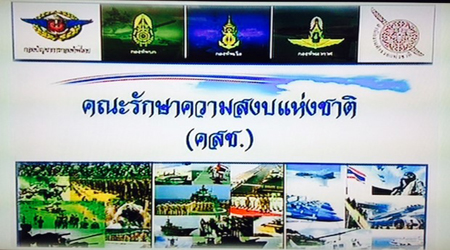Disturbing silence from the junta on southern unrest problem
As the National Council for Peace and Order has been busy addressing a host of pressing problems ranging from the outstanding payments for farmers under the rice pledging scheme, corruption, illegal gambling, forest encroachment to illegal parking and motorcycle taxies and lottery overpricing since it seized power from the Yingluck government on May 22, not a word was heard from the military junta about the unrest problem in the Deep South.
Is it because the southern unrest problem is not a pressing problem that warrants the junta’s attention? Or is it because the problem is now in a good hand that the junta can wait?
As a matter of fact, the situation in the far south remains worrisome with a few huge violent incidents that seems to have shaken the region. On May 24, two days after the coup in Bangkok, southern separatists set off more than 20 bombs in Pattani township, killing three innocent civilians and injuring over 50, including a number of children. Four days later on May 28, a bomb exploded beside the fence of Kok Po hospital in Pattani injuring more than 10 people.
On June 16, four suspected insurgents, riding on two motorcycles, arrived at a grocery in Tambon Sai Khao, Kok Po district of Pattani and opened fire indiscriminately into the shop, killing one Thai woman, Ms Kasenee Romkatekaew, and wounding two others, Songpol Kotcha-on and Karn Chantharaboon.
Famous for its charming Sai Khao waterfall, Tambon Sai Khao has always been regarded as a peaceful community. But not any more.
Besides the violent incidents, one major change took place since the military takeover. Pol Colonel Thawee Sodsong, secretary-general of the Southern Border Provinces Administration Centre, was abruptly removed. He was succeeded by Mr Panu Uthairat, deputy permanent secretary of interior.
Two influential figures in the restive region, Ousman Salemaeng and Je-awae Samaromoh, were summoned to meet with the military in Bangkok by the National Council for Peace and Order.
So far, the NCPO is yet to issue any order or introduce any measure to deal with the southern unrest problem. The uneasy silence on the part of the junta has resulted to a speculation that the junta may have confidence in Lt-Gen Walit Rojanapakdee, commander of the Fourth Army Region, and the situation is under control.
Or the southern unrest problem is a long-term problem and there is no need for the NCPO to rush to tend to it?
The above assumptions may be right or wrong. But for the NCPO’s information, the people in the deep south are still patiently waiting for the junta to make clear what they will do to deal with the unrest problem or with a few issues as follows:
Firstly, the peace talks with the separatist groups. Will the talks which started by the Yingluck government be resumed?
Secondly, the structure of the administration overseeing problems in the deep south. Is it true that Lt-Gen Walit is in full charge of the unrest problem?
Thirdly, how will the NCPO deal with the security-related problems such as narcotic and oil smuggling problems?
More importantly, several officials in the region have gained ill-gotten wealth from unlawful business activities and their heads are yet to roll by the NCPO. But for the locals, the flourishing of underground businesses are a cause of unrest that will keep the region on fire.

